[Editor’s note: This is the latest in a year-long occasional series of articles produced by InvestigateWest in partnership with The Tyee and other news organizations exploring what it will take to shift the Cascadia region to a zero-carbon economy, and is supported in part by the Fund for Investigative Journalism.]
The years-long battle against the Trans Mountain pipeline expansion is pumped with new urgency as Prime Minister Justin Trudeau and U.S. President Joe Biden plan to hold a climate summit next month.
Indigenous and community leaders announced earlier this month they are “beginning a new wave of action” against the project, also called TMX, which will increase the flow of bitumen crude from Alberta’s oilsands to be loaded on ships in Burnaby, B.C.
At the TMX construction site in Burnaby, protesters have established prayer circles and blocked cutting of trees to make way for the pipeline, resulting in arrests.
The ripples of resistance extend to other corners of the province, creating stress within many communities in the project’s path.
Three years ago, Mike McKenzie felt that he had to leave his home, and he’s not yet returned. He says he was no longer welcome in Skeetchestn, a community in central British Columbia west of Kamloops that’s one of 17 reserves in Secwepemc Nation.
His uprooting was by choice, but not by preference. McKenzie said he felt compelled to leave due to tensions around his outspoken opposition to TMX, which is building a second pipeline to pump heavy oil from Alberta’s tarsands to a tanker terminal near Vancouver.
Opposition comes with conflict since the project has also amassed considerable support within Secwepemc Nation. Some elected chiefs representing Secwepemc reserves say its environmental risks are manageable, and four signed long-term agreements for shared benefits between their communities and the pipeline. Meanwhile, some of the more traditional leaders within First Nations are opposed.
“I'm not living in my nation right now. And I can't live in my nation right now,” said McKenzie. He stays away, he says, because he feels unsafe there — that he is targeted and harassed by local police.
McKenzie’s spiritual connection to the land where he grew up harvesting fish and berries drove him to host rallies and candlelit vigils in Kamloops to oppose TMX. McKenzie’s Elders taught him the Secwepemc law, X7ensqt, which translates to “the land (and sky) will turn on you” if you disrespect the land.
McKenzie’s breaking point came when his dad, a Skeetchestn councillor, came under pressure to sign agreements supporting Trans Mountain, which he declined. The pressure was more intense because his son, living right there in his house, was a leading face of pipeline opposition.
McKenzie left home to relieve the pressure on his parents. Although he can’t return home, he says he must keep fighting.
As McKenzie put it: “We have to protect the land and the water no matter what. Our survival depends on it."
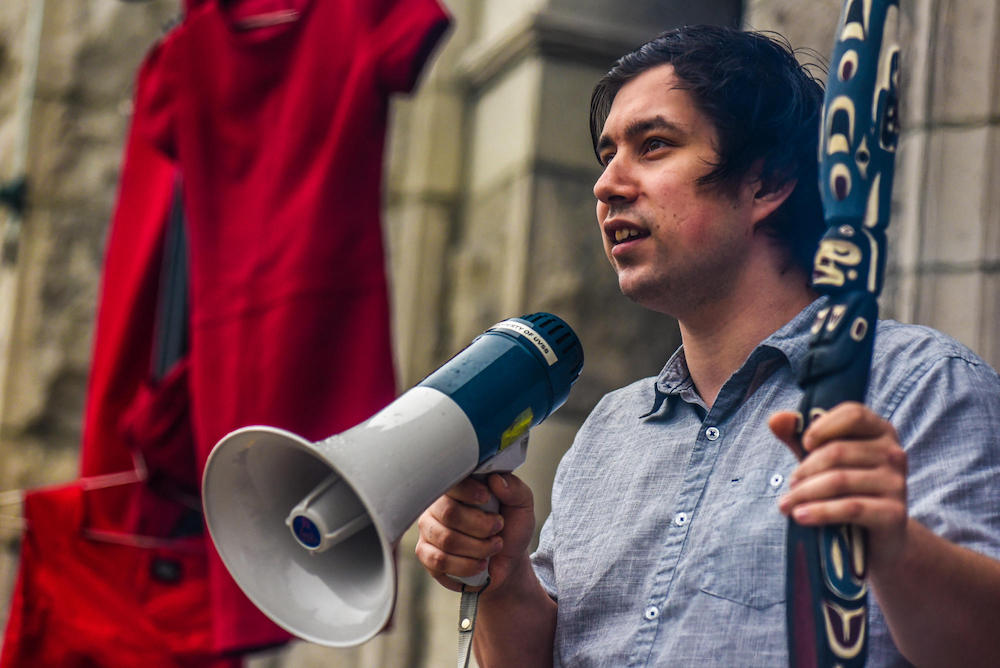
McKenzie and other Indigenous opponents of the Trans Mountain pipeline comprise the vanguard of a network of eco-activists, local governments, economists and lawyers fighting new pipeline infrastructure under construction in British Columbia. Opponents decry how TMX and a natural gas pipeline farther north, Coastal GasLink, will lock in decades of dangerous greenhouse gas emissions and, they say, compromise Indigenous land rights.
They are blockading roads and construction sites and even banks and insurers backing Trans Mountain. Some involved in the civil disobedience reject the label “protesters.” They call themselves “land defenders.” And 95 per cent of British Columbia’s lands are unceded by First Nations, meaning they never signed away rights to the land and thus retain some title under Canadian law.
With both pipelines already under construction, they are fighting seemingly long odds. But pipeline activists have beaten tough odds before. While federal courts and the government pipeline regulator have defeated numerous challenges put forward by the activists, they recognize that a pipeline has zero value until its last mile is connected. “In order to be one-per-cent useful, it needs to be 100-per-cent complete,” said lawyer Eugene Kung of West Coast Environmental Law.
The two B.C. projects are large on the radar of climate activists beyond the province’s borders. Opponents are part of a broader protest movement that blocked nearly every proposal to ramp up exports of coal, oil and natural gas from the West Coast for a decade. That movement fears TMX and Coastal GasLink will punch two big holes in what activists called their Thin Green Line against fossil fuel exports from North America’s western coast.
Coastal GasLink is designed to feed natural gas from the province’s northeastern gas-fracking fields to an export terminal under construction near Kitimat, B.C., about 110 kilometres southeast of Prince Rupert. Coastal GasLink ignited a national uprising last year, when people across Canada orchestrated blockades and demonstrations to support hereditary chiefs from Wet’suwet’en Nation who oppose the project — tensions that remain unresolved.
The fate of B.C.’s fossil fuel megaprojects — along with comparable developments worldwide — will help determine whether greenhouse gases can be slashed to contain the threat of catastrophic climate change. Climate scientists and, increasingly, even traditionally conservative energy planners such as the Paris-based International Energy Agency, say building new fossil fuel infrastructure undermines climate action.
Government-backed fossil fuel infrastructure
B.C.’s pipelines broke through with forceful government backing. Full-throated provincial endorsement launched Coastal GasLink, owned by Calgary-based TC Energy, in 2018. The same year, Canadian Prime Minister Justin Trudeau’s C$4.5-billion acquisition of Trans Mountain secured its expansion project just after the Indigenous activists and their allies, against seemingly impossible odds, hounded the pipeline’s original developer, Texas-based Kinder Morgan, into essentially abandoning the project.
“This is a pipeline in the national interest and it will get built,” said Prime Minister Trudeau. The federal takeover changed the playbook for pipeline resistance.
“Our strategy was… making the projects such a headache [that] the companies were willing to abandon them. We got to that point with Trans Mountain. But we didn't prepare for a world in which the federal government bought the pipeline and assumed all the risk around it,” said Sven Biggs of Stand.earth, an activist group operating from offices in Vancouver, San Francisco and Bellingham, Washington.
The significance of Trudeau's move is hard to overstate. Trans Mountain’s expansion will triple its capacity from 300,000 barrels per day to 890,000 barrels per day. The new line terminates at a shipping terminal in Burnaby, east of Vancouver, where the oil can be shipped for refining in Asia, and spur lines and barges also link the pipeline to Washington state's refineries.
Mark Jaccard, a sustainable energy professor at Simon Fraser University, calculated that producing tarsands oil known as bitumen and pumping it to Burnaby would release the equivalent of 7.7 million metric tons of CO2 per year in Alberta and B.C. — as much as 2.2 million cars — while refining, distributing and burning the bitumen would release another 71 million metric tons overseas.
Farther north, the 670-kilometre-long Coastal GasLink pipeline is designed to initially carry 2.1 billion cubic feet of natural gas each day to Kitimat. There, the fracked gas is to be liquified for export, emitting 4 million metric tons of CO2 annually. The capacity of the pipeline and export facility could be expanded in future phases.
Trans Mountain and Coastal GasLink began building in 2019 and intend to begin pumping by the end of 2022 and in 2023, respectively. Each is roughly one-quarter built, but work has slowed recently amidst environmental violations and safety incidents, including some connected to the coronavirus pandemic.

Anti-pipeline activists say the arrival of COVID-19 has cut both ways for their cause. On the one hand, it’s distracted people and made organizing harder.
On the other hand, in December the provincial health authority ordered B.C.'s pipeline projects to scale down the number of workers on-site to reduce COVID-19 transmission. Safety regulators also ordered a two-month project-wide pause at Trans Mountain after a second serious worksite accident in recent months.
In January, the province ordered an audit of Coastal GasLink's erosion-control measures, after officials discovered compliance violations and risks to watersheds along the pipeline route.
As of early last month, 76 kilometres of the TMX route — eight per cent of the total — remained to be finalized. A First Nation situated approximately 100 kilometres southwest of Kamloops is holding hearings on the risks Trans Mountain poses to its drinking water aquifer. The Coldwater band, a reserve in Nlaka'pamux Nation territory, is pushing Canada Energy Regulator to reject the proposed route.
The project faces legal challenges from two First Nations whose territories touch Vancouver’s harbour as well (see sidebar).
‘Civil disobedience is the only option we have left’
Meanwhile, confrontation continues. On the coast and in interior B.C., people are regularly arrested for obstructing Trans Mountain work sites.
Frequent activity occurs in Burnaby, B.C., the terminus of Trans Mountain in the traditional territory of the Tsleil-Waututh Nation. Coast Salish community members occupy a watch house in Burnaby, where they keep vigil and host ceremonies to oppose the project. About five kilometres south of the watch house, activists inhabit a treehouse camp from which they work to delay Trans Mountain’s plan to clear roughly 1,300 trees adjacent to the salmon-bearing Brunette River.
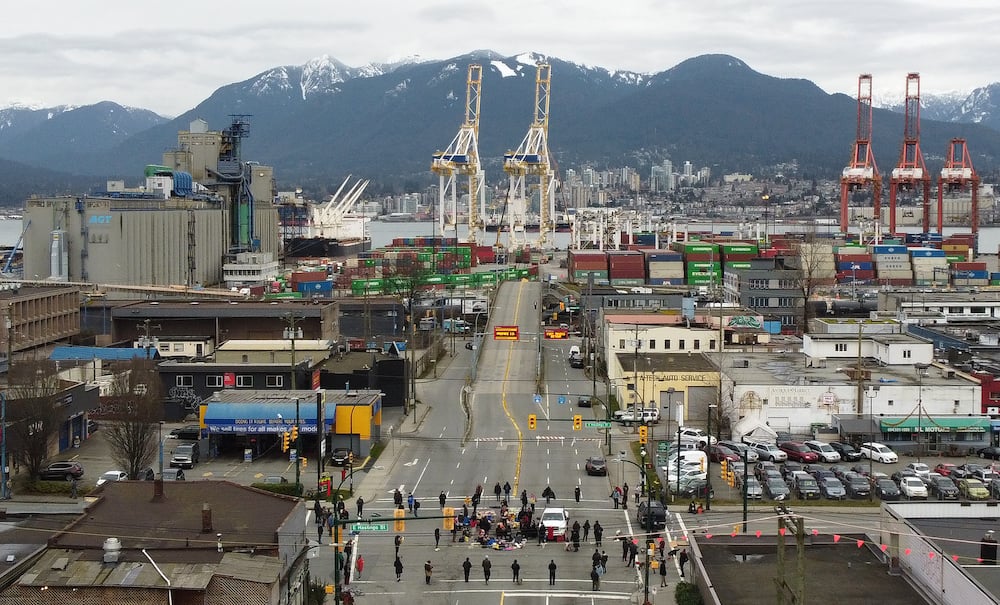
Further resistance occurs along the pipeline route, such as in Secwepemc territory, where a group is fighting Trans Mountain from a camp of tiny homes near the Blue River community, 175 kilometres northeast of Kamloops.
Southwest of that camp, Romilly Cavanaugh was arrested in October with others after chaining herself to a worksite gate to delay construction. An environmental engineer who briefly worked for Trans Mountain in the 1990s, Cavanaugh said she got involved on the frontlines because she had no other choice. “There is no way to take a dirty industry like that and make it clean,” she said.
Cavanaugh cites the carbon emissions the pipelines will spur and limited advancements in technology for cleaning up oil spills. Trans Mountain will increase tanker traffic by at least sevenfold in the Salish Sea waters shared by the U.S. and Canada.
Data from the International Tanker Owners Pollution Federation and Transport Canada lends credence to Cavanaugh’s concern. According to both the Canadian agency and the global tanker spill advisory organization, no more than 15 per cent of oil is recovered in a typical spill. And spill recovery may be even lower for spills of the diluted bitumen carried by Trans Mountain, which is the heaviest form of crude. It tends to sink to the bottom.
“From my perspective, civil disobedience is the only option we have left,” said Cavanaugh.
Other activists continue hammering the financial front, with a little help from Trudeau. The Prime Minister unveiled a revamped climate plan in December, but heightened climate action by his government may not ease the pressure on B.C.’s pipeline projects. In fact, in the hands of expert activism, it may do the opposite.
More than 100 Canadian economists and policy experts signed a letter to Trudeau questioning the viability of the Trans Mountain expansion in September 2020. The letter noted weakened oil demand amidst the pandemic and doubts from oil giants such as Shell and BP about whether demand would “fully recover” after COVID-19. It also cited the International Energy Agency's conclusion that oil demand must decline by nearly a third over the next two decades to limit global warming.
Meanwhile, federal agencies and auditors have sharpened the experts’ attack on Trans Mountain’s viability. Just before Trudeau’s climate policy announcement, Canada Energy Regulator, the agency that oversees the Trans Mountain expansion, reported that tougher policies might cut oil use and thus eliminate the need for additional pipelines.
The parliamentary budget officer echoed that finding a few weeks after Trudeau’s announcement, writing that the federal government could lose money on Trans Mountain under strengthened climate policy.
Adding uncertainty to the financial stability of the project, at least three of the pipeline’s 11 big insurers recently walked away from Trans Mountain, under pressure from environmental campaigners.
‘We will always be here’
In October, two days after Cavanaugh’s arrest, Miranda Dick laid down a blanket outside a Trans Mountain gate near Mission Flats, B.C., a community adjacent to the Thompson River, which Trans Mountain has drilled beneath repeatedly to install pipe. On the blanket, Dick’s sister cut her hair off. Moments later, she was arrested with others for breaching an injunction prohibiting unauthorized access to Trans Mountain work sites.
The 489-kilometre-long Thompson River is one of roughly 250 salmon-supporting streams and rivers in the Fraser River watershed transected by Trans Mountain. It hosts one of the largest Sockeye salmon runs in the world. The resulting threat to salmon populations is the project’s single greatest risk, says Dick, the daughter of Hereditary Chief Sawses, who was also arrested two days prior.
“I want to protect clean water for the salmon and our livelihoods, not to mention the other links in the chain. The bears, the eagles, everything that lives off of salmon,” said Dick.
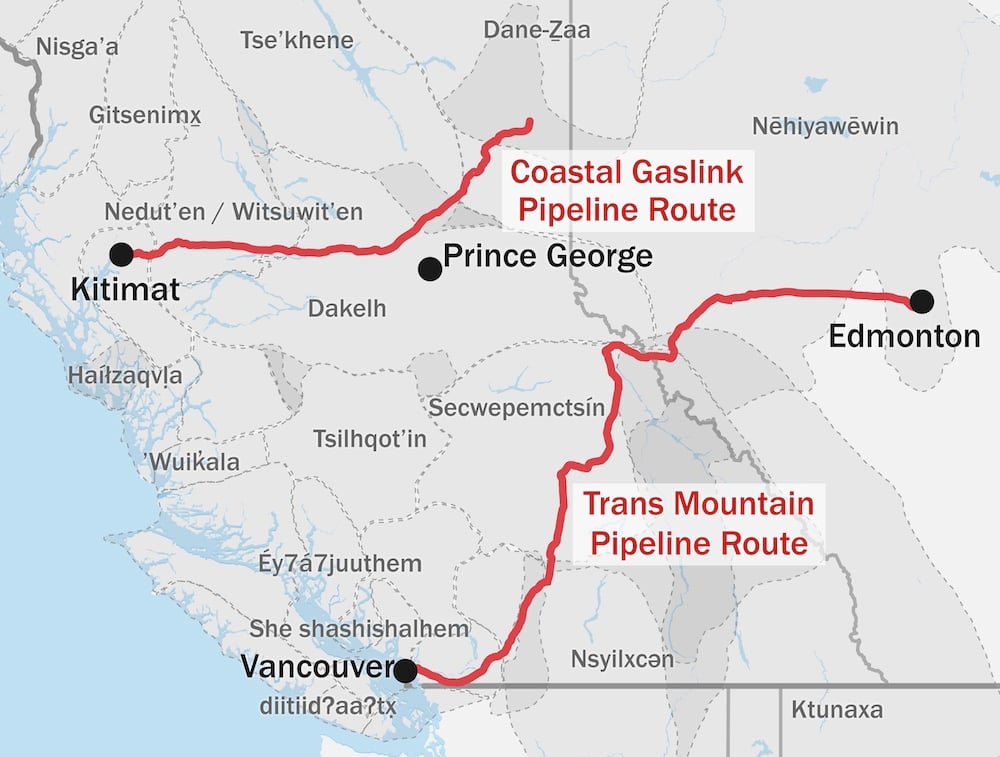
Dick says her hair collected knowledge in the two and a half years she grew it out — knowledge she let go of that day. She said the ceremony symbolizes the grief and loss Trans Mountain brings her.
Secwepemc people have opposed Trans Mountain since 2013, asserting Secwepemc law on historically occupied lands that were never ceded to Canadian governments. They follow hereditary leadership, traditional governance systems that vary between nations. Title and authority passes down generationally through families but is also “granted on merit” after “many years of training in culture and tradition,” according to reporting earlier this month by The Tyee. Hereditary leaders retain the authority to oversee their nations’ ancestral territories.
But some elected chiefs and band councils have chosen their own path on pipeline projects for their reserves — colonial land set-asides and Indigenous governments created, funded and overseen by the federal government under Canada’s Indian Act. As of February 2020, 58 First Nations had signed “mutual benefit" agreements with Trans Mountain.
The Whispering Pines Clinton Indian Band is one of four Secwepemc reserves with a signed agreement. Its elected chief, Mike LeBourdais, represents one of at least three First Nations groups seeking to purchase the project. His community will receive a share of operating revenue from the project, which he said would support education efforts, elders’ retirement programs and environmental oversight of the pipeline.
In an interview with InvestigateWest, LeBourdais said he signed the benefit agreement because he wants to have agency in the project. He said his lawyers assured him the project would be approved regardless of the circumstances.
“This is what I'm fighting for — to be in the conversation. In the economy of British Columbia and Canada,” he said.
Such divisions place the projects on unsteady ground, as the unresolved conflicts over the Coastal GasLink pipeline show. Central to the conflict is the RCMP’s arrests of Wet’suwet’en land defenders in their territory, which galvanized a solidarity movement of blockades and rallies across the country.
The tension began to rise sharply in 2019, a year before the Canada-wide protests. On Jan. 8, 2019, RCMP officers breached a camp in Wet’suwet’en territory established in 2018 to oppose Coastal GasLink. The RCMP came armed with a court injunction and made 14 arrests.
Sleydo’ Molly Wickham, a member of the Wet’suwet’en Nation, was among those arrested that day. She recalls being “surprised and horrified” by the intensity of conflict.
Wickham’s clan, the Gidimt’en, is one of five clans within Wet’suwet’en Nation. Hereditary chiefs representing all five clans are united in their opposition to Coastal GasLink. Since 2006, they have opposed all pipeline proposals in their territory, noting efforts to protect water, wildlife and their livelihoods.
And it is the centuries-old hereditary system that holds territorial power, as recognized even by Canadian law under a 1997 Supreme Court landmark decision stating that hereditary governance represents “all of the Wet’suwet’en people.”
Yet, Coastal GasLink signed mutual benefit agreements with five out of the six chiefs elected by the federally created Wet’suwet’en bands. (The company also says it has awarded C$825 million in contracts to Indigenous and local businesses.)
Thus, the tensions were already high by February 2020 when the RCMP arrested about two dozen people in Wet'suwet'en territory to enforce a new project injunction. The conflict ignited national backlash. Mass demonstrations in solidarity with the Wet’suwet’en blocked highways, ports, rail lines and other infrastructure from coast to coast, for as long as five weeks. Rallies disrupted traffic, universities and legislatures.
The conflict abated in March when the Canadian and B.C. governments opened negotiations with the Wet'suwet'en over their land claims. But conflict could erupt again without warning.
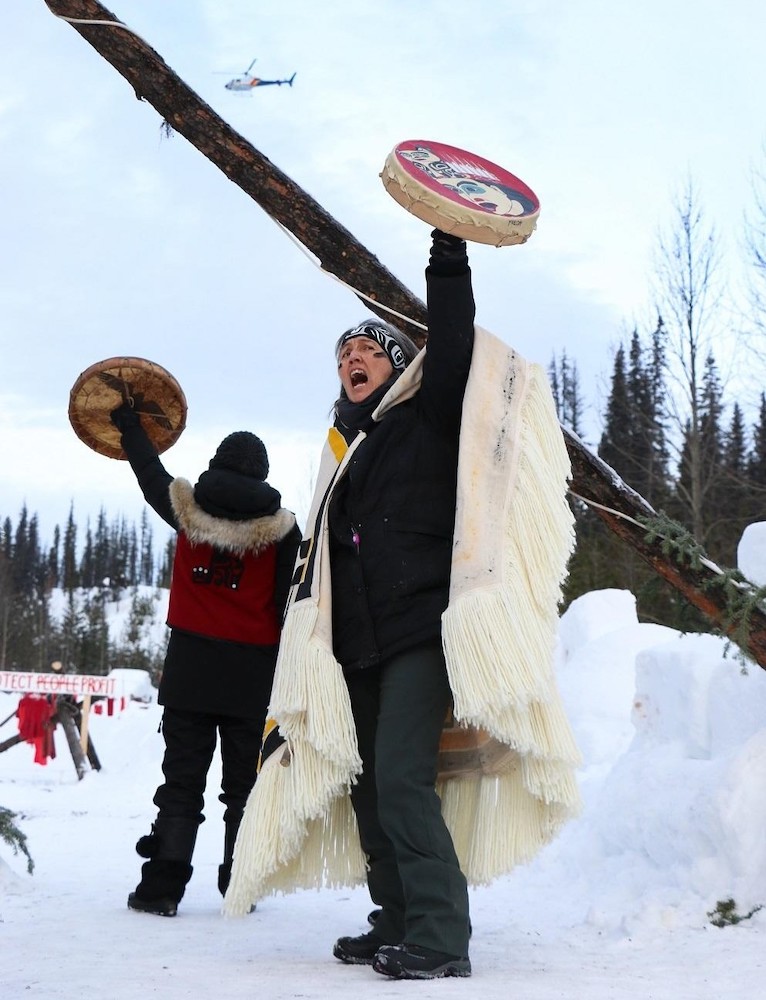
The persistent threat of an uprising has even some ardent pipeline supporters seeing the opposition holding the upper hand. One Alberta columnist wrote last month that only Indigenous ownership can secure Trans Mountain's success, calling on Alberta’s premier to “convince the Trudeau Liberals to quickly strike a deal on Trans Mountain” with First Nations groups.
Wickham says it’s “inevitable” conflict will flare up on Wet'suwet'en territory again since her community has not agreed to stand down. B.C. Premier John Horgan has presented the liquified natural gas sector as an economic growth engine, and currently four more proposed gas pipeline projects are pending.
Two of those projects would cross Wet’suwet’en territory. The Wet’suwet’en hereditary leaders, noted Wickham, oppose both.
“Wet’suwet'en will never ever go away. We will always be here,” said Wickham.
A province roiled from edge to edge
From the forests of B.C.’s interior to the busy streets of its largest city, the battle over the two pipelines shows no sign of evaporating. In fact, it’s moved to new places, carried forward by new faces.
Angered that an Indigenous Elder was handed a 90-day sentence for participating in a smudging ceremony at the TMX site in Burnaby, a group comprising mainly Indigenous youth, calling themselves the Braided Warriors, blocked the vital intersection of Hastings and Clark streets near the port entrance on March 3. The rally lasted 24 hours and four were arrested.
Nine days later, members of the same group helped block rail access to the port, leading to more arrests by police using, the group says, violent excessive force.
On Friday, a group of largely white, school-aged activists across Metro Vancouver, the Sustainabiliteens, gathered in front of Environment Canada’s downtown Vancouver offices to call for an end to the TMX project and lend their support to the Braided Warriors and other land defenders.
Said Sustainabiliteen member Tavie Johnson: “Traditionally, the environmental movement and the conservation movement have been very whitewashed, and we know that we can’t have climate justice without racial justice and Indigenous sovereignty and Indigenous rights. All of those are extremely interconnected.”
With files from Tyee staff ![]()
Read more: Indigenous, Energy, Rights + Justice, Politics, Environment


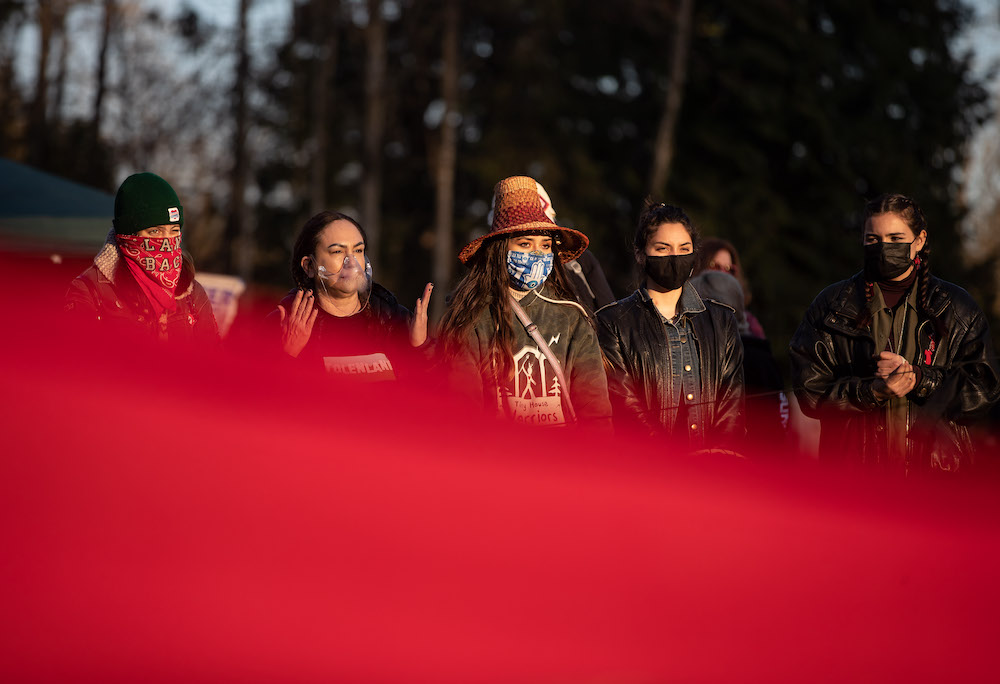












Tyee Commenting Guidelines
Comments that violate guidelines risk being deleted, and violations may result in a temporary or permanent user ban. Maintain the spirit of good conversation to stay in the discussion.
*Please note The Tyee is not a forum for spreading misinformation about COVID-19, denying its existence or minimizing its risk to public health.
Do:
Do not: